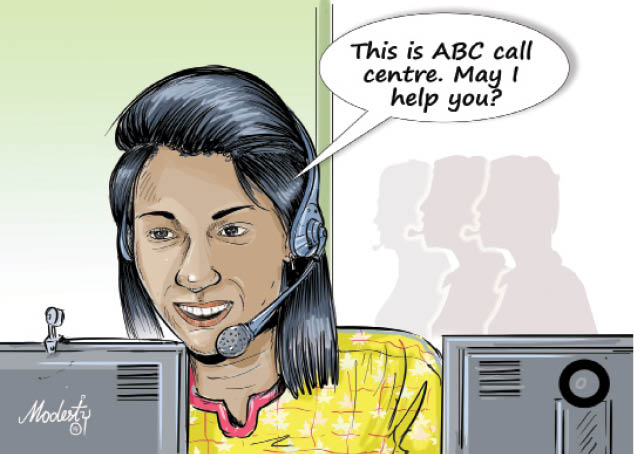- -How working at call centres, exposure to loud sounds through phones, headsets, others put you at risk
John, 40, works at a radio station and his job involves sitting in the studio using a head set throughout the day, for his music, phone-in programmes and talk shows. He said two years ago, he began to feel as if he was being stabbed in the ears with a knife.
After sometime, he began to feel headache, ear pain, jaw and neck pain, noises in the ear, fatigue and sensitivity to sound. He visited a hospital when he noticed he also became depressed as the condition worsened.
Like John, many people working in call centres or at jobs associated with exposure to unexpected loud sounds or excessive noise emitted from both handsets and headsets have increasingly reported injury and symptoms of a condition experts refer to as acoustic shock disorder.
Employees of call centres are at risk of experiencing it because they are often exposed to these sounds during their workday as they sit with headsets on most of the day. Medical experts say even just listening to the callers at a high level can contribute to the risk of acoustic shock.
The symptoms occur because of a strong muscle contraction in the middle ear after exposure. The acoustic shock can cause a tearing of the inner membrane in the ear, experts say.
According to Dr Abdulazeez Ahmed, a Consultant Otolaryngologist, Hearing and Balance disorders, acoustic shock disorder (ASD) is used to identify persistent symptom-clusters of ear pain, ear fullness, tinnitus (abnormal noises in the ears), intolerance of loud sounds, muffled hearing, vertigo/dizziness and other unusual symptoms such as numbness or burning sensations around the ear. A severe ASD can lead to Post Traumatic Stress Disorder (PTSD) further compounding the problem.
He said the condition is caused by an involuntary response to a sound perceived as traumatic following exposure to a sudden unexpected loud sound (acoustic incident), adding that the degree of trauma is influenced by the psychological context of the workplace and/or environment where the acoustic incident exposure occurred.
Explaining the condition, Don McFerren, an Ear, Nose, and Throat (ENT) surgeon, said it has long been recognised that excessive sound can damage the auditory system.
“In the latter part of the 20th century a different pattern of noise damage to the auditory system started to emerge: employees working in call centres reported symptoms following brief exposure to sudden unexpected sounds through their telephone handsets or headsets.
“They described pain in around the ear, tinnitus, dizziness, hyperacusis, altered hearing and a blocked sensation in the affected ear or ears. For some people the symptoms were short lived but in others the problem persisted and other symptoms developed including hypervigilance, anxiety, depression, insomnia and post-traumatic stress disorder (PTSD). This symptom cluster following unexpected noise exposure through telecommunications equipment became known as acoustic shock injury, acoustic shock disorder, acoustic shock syndrome or simply acoustic shock.”
On the prevalence of the condition in Nigeria and the rest of the world, Dr Abdulazeez Ahmed said, “Healthcare professionals providing hearing assessment, dizzy spells and tinnitus therapy are increasingly encountering some or all of the cluster of ASD symptoms among their patient population. In developed countries e.g. Australia, reports out of a total population of 16,000 call centre workers, 103 people were diagnosed, this was in the late ‘90s.
“This trend has however dwindled tremendously due to better health care and health seeking behaviour in these countries. In Nigeria, no prevalence or incidence studies are available, because at-risk populations do not volunteer symptoms, or are afraid of losing their jobs or their employers shield them from potential hearing healthcare professionals under the guise of employment contracts,” he said.
Dr Ahmed, who is also an associate professor, said call centre staff are particularly at risk of the condition in Nigeria.
“One of the highest employers of labour in the private sector in Nigeria today are mobile phone operators/network providers/operators, employing mostly young people to man their call centres. With the rapid growth of mobile network providers, Nigeria has witnessed a commensurate rise in call centre staffing across the country which also signifies a potential rise in undiagnosed ASD,” said Dr Ahmed.
The expert said the condition could be prevented through:
– Bi-annual screening exercises for call centre staff.
– Headset with automatic high noise clipping control (feedback control).
– Reduction in incidence of malicious whistle blowing by dissatisfied customers across headsets among others.
– Reduction in high ambient sounds typical of large open call centres control rooms.
Also, experts advise people to go for headsets which can protect hearing when wearing a telephone headset. Some high-quality headsets contain amplifiers which provide some degree of protection from excessively loud sounds, and automatically lower the sound when an High Pitched Tones (HPT) occurs on the line.
Dr Ahmed said the condition is diagnosed from the presence of the cluster of symptoms mentioned above, and call centre staff or persons who work with headsets most of their daily working time, like TV or radio.
It can also be diagnosed through regular check or screening with hearing health professionals.
The consultant otolaryngologist said the following are ways to treat the disease:
– Medical/drug therapy
– Cognitive behavioural therapies
– Hearing aids in some situations
– Other natural therapies
– At the very worst case scenario, change of job/occupation for recalcitrant cases etc.
The experts said call centre staff are the country’s youths as well as our leaders of tomorrow, therefore, employers must allow adequate screening and treatment of afflicted staff fully paid by them.
“There should be enforcement of the workman’s act enshrined in the law for compensation purposes. GSM operators must be forced to allow, encourage and fund research into acoustic shock disorder (ASD),” he advised.

 Join Daily Trust WhatsApp Community For Quick Access To News and Happenings Around You.
Join Daily Trust WhatsApp Community For Quick Access To News and Happenings Around You.


